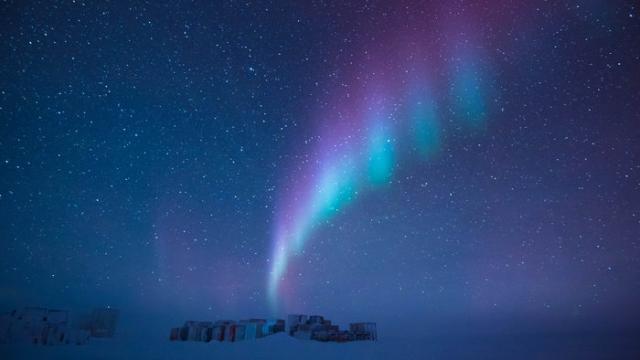At a lonely research station at the end of the world, a group of hardy men and women have spent the last four months in total darkness. The temperature outside hovers around (-67.8°C). But the team received a well-earned bonus recently, when a gorgeous aurora australis rippled across the southern sky.
The European Space Agency just released this incredible photo of the aurora over Concordia station in Antarctica, where small band of researchers are bunked up doing science in conditions similar to what future astronauts might experience on other worlds or in deep space. Several of the group are studying Antarctic glaciology and climate, while a British medical doctor is exploring how human physiology and psychology adapt to extreme environments. They have got four months to go before any fresh supplies are flown in.
But the Old Ones are merciful! The Concordia team does have Internet access, and they happen to be running an AMA on Reddit today. The group offers this description of life on the bitter edge of the Earth:
It is one of the remotest, coldest, driest places on Earth, we are 1200 km from the coast and our nearest neighbour is 600 km away: the Russian station Vostok. The landscape is an immense white, flat surface of compacted snow extending 1000 km in all directions. The snow and ice on which we walk is more than 3 km thick. Living here is like living on another planet, ‘Planet Concordia’ or ‘White Mars’. During the nine months of winter from February to November, the station is completely isolated from the rest of the world.
No plane or vehicle can reach us, even in an emergency as the harsh weather conditions make all travel impossible. We have experienced temperatures down to — 80°C and three months of complete darkness. The multicultural crew is consists of 13 people: seven for logistics and six scientists. We are five Italians, one Swiss, one English and six French.
This year we are three women and ten men from 24 to 56 years old. We must rely on our own skills and teamwork while being prepared to face any kind of emergency through training, fire, rescue and medical exercises.
If you’ve got a burning — or freezing, as it were — question about survival in Antarctica, hop on over to Reddit and ask!
[ESA [Reddit]
Top image via ESA/IPEV/PNRA — B. Healey
